Ic vol 1 - Study guides, Class notes & Summaries
Looking for the best study guides, study notes and summaries about Ic vol 1? On this page you'll find 40 study documents about Ic vol 1.
Page 4 out of 40 results
Sort by
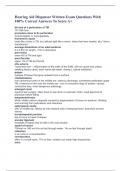
-
Hearing Aid Dispenser Written Exam Questions With 100% Correct Answers To Score A+
- Exam (elaborations) • 11 pages • 2024
-
- $13.49
- + learn more
Hearing Aid Dispenser Written Exam Questions With 100% Correct Answers To Score A+ db loss of a perforation of TM 10-15db loss procedure done to fix perforation tympanoplasty or myringoplasty monomeric spots looks like a hole in TM, but reflects light like a mirror. holes that have healed. aka "mirror membranes" average dimentions of an adult eardrum 2.3-2.9cm in length, .7cm in diameters pars tensa lower 4/5 of TM and tight pars flaccida upper 1/5 of TM and flaccid otis externa...
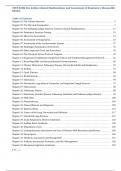
-
TEST BANK Des Jardins Clinical Manifestations and Assessment of Respiratory Disease, 8th Edition
- Exam (elaborations) • 209 pages • 2024
-
- $17.99
- + learn more
TEST BANK Des Jardins Clinical Manifestations and Assessment of Respiratory Disease, 8th EditionTable of Contents Chapter 01: The Patient Interview ................................ ............................. 3 Chapter 02: The Physical Examination ................................ .......................... 7 Chapter 03: The Pathophysiologic Basis for Common Clinical Manifestations ........................ 11 Chapter 04: Pulmonary Function Testing ................................ .................
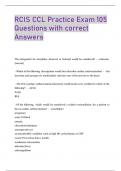
-
RCIS CCL Practice Exam 105 Questions with correct Answers
- Exam (elaborations) • 15 pages • 2023
-
- $17.99
- + learn more
RCIS CCL Practice Exam 105 Questions with correct Answers The antagonists for morphine, demerol, or fentanyl would be considered? - -naloxone (narcan) -Which of the following descriptions would best describe cardiac catheterization? - -the insertion and passage of a small plastic cath into one of the arteries to the heart -The CCL (cardiac catheterization laboratory) staff needs to be certified in which of the following? - -ACLS PALS BLS -Of the following, which would be considered ...
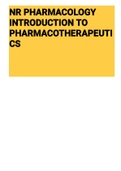
-
NR PHARMACOLOGY INTRODUCTION TO PHARMACOTHERAPEUTICS
- Exam (elaborations) • 94 pages • 2022
- Available in package deal
-
- $8.99
- + learn more
Exam (elaborations) NR PHARMACOLOGY INTRODUCTION TO PHARMACOTHERAPEUTICS NR PHARMACOLOGY INTRODUCTION TO PHARMACOTHERAPEUTI CS INTRO TO PHARMACOTHERAPEUTICS Prescription Writing Need at least 2 patient identifiers: Name, DOB, Address, Date of Rx, Prescriber name, address, license number, DEA number if applicable, Info for supervising MD, Drug: name/strength/dose/route/QTY/refills, Signature JC ¡§Do Not Use¡¨ List ¡E U: write out ¡§unit¡¨ ¡E IU: write out ¡§international uni...
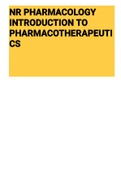
-
Exam (elaborations) NR PHARMACOLOGY INTRODUCTION TO PHARMACOTHERAPEUTICS
- Exam (elaborations) • 94 pages • 2022
-
- $9.49
- + learn more
Exam (elaborations) NR PHARMACOLOGY INTRODUCTION TO PHARMACOTHERAPEUTICS Need at least 2 patient identifiers: Name, DOB, Address, Date of Rx, Prescriber name, address, license number, DEA number if applicable, Info for supervising MD, Drug: name/strength/dose/route/QTY/refills, Signature JC “Do Not Use” List • U: write out “unit” • IU: write out “international units” • Q.D., Q.O.D.: write out daily or every other day • Trailing/leading zeros • MS, MSO4, MgSO4: writ...
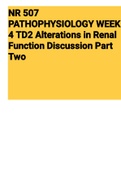
-
Exam (elaborations) NR 507 PATHOPHYSIOLOGY WEEK 4 TD2 Alterations In Renal Function Discussion Part Two
- Exam (elaborations) • 20 pages • 2022
-
- $8.49
- + learn more
Exam (elaborations) NR 507 PATHOPHYSIOLOGY WEEK 4 TD2 Alterations In Renal Function Discussion Part Two This week's graded topics relate to the following Course Outcomes (COs). 1 Analyze pathophysiologic mechanisms associated with selected disease states. (PO 1) 2 Differentiate the epidemiology, etiology, developmental considerations, pathogenesis, and clinical and laboratory manifestations of specific disease processes. (PO 1) 3 Examine the way in which homeostatic, adaptive, and co...
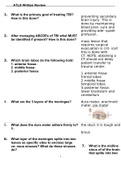
-
ATLS Written Review
- Exam (elaborations) • 37 pages • 2023
- Available in package deal
-
- $12.49
- + learn more
1. What is the primary goal of treating TBI? How is this done? 2. After managing ABCDEs of TBI what MUST be identified if present? How is this done? 3. Which brain lobes do the following hold: 1. anterior fossa: 2. middle fossa: 3. posterior fossa: preventing secondary brain injury. This is done by maintaining blood pres- sure and providing ade- quate profusion. mass lesion that requires surgical evacuation is crit- ical! this is done with CT. NOTE: obtaining a CT should not delay patie...
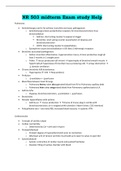
-
NR 503 midterm Exam study Help
- Class notes • 6 pages • 2021
-
- $5.50
- + learn more
NR 503 midterm Exam study Help Pulmonary Anticholinergics and tx for asthma, bronchitis and assoc pathogenesis o Anticholinergics block acetylcholine receptors for bronchoconstriction; thus: bronchodilation Asthma: short acting counter to expose to trigger Bronchitis: short acting counter exacerbation of dyspnea and bronchoconstriction COPD: Short acting counter to exacerbation, o Epinephrine causes bronchodilation in ER: Beta-2 Adrenergic receptors Bronchitis assoc...
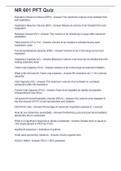
-
NR 601 PFT Quiz nd answers.
- Exam (elaborations) • 2 pages • 2022
-
- $10.99
- + learn more
Expiratory Reserve Volume (ERV) The maximum volume of air exhaled from end expiration. Inspiratory Reserve Volume (IRV) Maximum volume of air inhaled from end inspiration 00:29 01:26 Residual Volume (RV) The volume of air remaining in lungs after maximum exhalation. Tidal Volume (VT or TV) Volume of air inhaled or exhaled during each respiratory cycle Functional Residual capacity (FRC) Volume of air in the lungs at rest end expiration Inspiratory Capacity ...
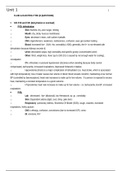
-
NURS 303 Med surg final exam study guide; A+ guide.
- Summary • 46 pages • 2021
-
- $15.49
- + learn more
FLUID & ELECTROLYTES (8 QUESTIONS) • S/S FVE and FVD (dehydration & overload) • FVD: dehydration o Skin: flushed, dry, poor turgor, tenting o Mouth: dry, sticky mucous membranes o Eyes: decrease in tears, soft sunken eyeballs o CNS: Apprehension, weakness, restlessness, confusion, eyes get sunken looking o Blood: Increased Na+ , BUN, Hct, osmolality (>300); generally, the K+ is not elevated with dehydration because kidneys excrete it) o Urine: decreased output, high osmolality ...

That summary you just bought made someone very happy. Also get paid weekly? Sell your study resources on Stuvia! Discover all about earning on Stuvia


